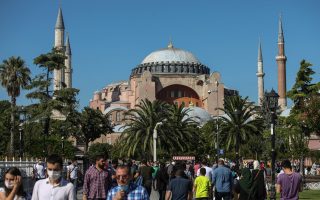Ex-PM Samaras tells Kathimerini deterrence is key to dealing with Turkey

“You do not appease the expansionist. That way he becomes even more ruthless,” Antonis Samaras told Kathimerini, noting exploratory contacts with Ankara, which started yesterday in Istanbul, cancel possible sanctions on Turkey. The former prime minister (2012-15) even says he is opposed to a possible appeal to the International Court of Justice in The Hague, since, as he says, “it is an ab initio renunciation of all international law privileges for us.”
Regarding the Prespes agreement, Samaras notes: “We did not ‘solve’ any problem. The problem we had shifted into another – more dangerous – one,” as “Turkey’s infiltration in the region was not halted after the Prespes agreement – on the contrary, it escalated.” In this context, he keeps the option of voting against the memoranda of cooperation with North Macedonia, when they come to Parliament, open.
Finally, regarding the economy, the former prime minister, clarifying that the government is not to blame for the pandemic, calls on the European Union for “partial debt relief for all countries” to restore growth.
What are Greece’s “red lines” in the exploratory contacts with Turkey and how do you think the Greek side should react in case our neighbors bring a broader agenda to the table?
There is no discussion for Greece other than the delimitation of the continental shelf and the exclusive economic zone. However, starting exploratory contacts rules out any discussion on sanctions against Turkey. Everyone understands that the international community does not “punish” a country when it is formally in negotiations. At the same time, Turkey does not accept the [United Nations Convention on the Law of the Sea (UNCLOS)]. It threatens to use force, something the UN Charter prohibits; it snubs the whole world and constantly raises new issues against us. It contests our sovereignty over our islands (except for a limited territorial sea). It calls for the demilitarization of Greek islands in the Aegean. It is colonizing Famagusta and demands a “two-state” solution in Cyprus. It is drilling in the Cypriot EEZ and has been encroaching on the Greek continental shelf for months. With the Libya-Turkey maritime deal, it has tried to create a fait accompli to the detriment of Greece. Remember this: Thrace is the next peak of the Turkish threat. They are already calling for a revision of the Treaty of Lausanne. This is the “broader agenda” set by Turkey. All this, under the pressure of constant challenges, like the successive Navtexes (navigational advisories). We are not discussing all these issues set by Turkey, of course. They are not just red [lines] – call them crimson.
What should we do if they insist?
We insist as well: We refuse to discuss how we will share the sovereign rights of Greece. Because, if we agree to enter into such a discussion, the issue will not be “give them something to save the rest” – as some claim. If they get something now, they will come back with new threats, to get more. That is why I said there is no dialogue with “pirates.” Let me put it another way: You do not appease the expansionist. That way he becomes more ruthless. Deterring him is the only way to deal with him. What we need is to strengthen our deterrence against an aggressive Turkey. How? By forging strong alliances, for which, fortunately, the ground exists today. With determination, so no one takes for granted that Greece will give in, whether it likes it or not.
In the event of leaving the dialogue table, who will be responsible for the failure of the whole procedure?
When you defend your rights and international legitimacy, when you do what any sovereign country would do in your position, there is no question of responsibility. If Greece refuses to negotiate its sovereignty and its sovereign rights with Turkey, then its friends – that is, those countries already rallying against Turkey – will be pleased. While Turkey’s friends will not. In contrast, if Greece gives in under Turkish pressure of threats, then its friends will be disappointed. If we are interested in building strong alliances in our region – now that a coalition of countries is forming against Turkey – we must not disappoint our potential allies. You make alliances when you ‘converge’ with your friends, not when you try to satisfy your enemy’s friends. I mean, beyond the blame game we try to play, there is also a power game we must one day learn.
Is Germany a “friend of Turkey” today?
Well, so far it has not treated Greece and Cyprus in a friendly manner. Nor in a very “European” one, I would say.
Generally, are you satisfied with the EU’s reaction so far, or did you expect something different? And if the latter, what?
Obviously it does not satisfy me. It cannot even defend two of its member-states – Greece and Cyprus – which receive threats from a third country, Turkey. It is inconceivable how European countries, such as Germany or Spain, arm Turkey to threaten European member-states with European weapons. I would point out, of course, that now there are many peoples and governments in Europe who have fully understood what Turkey is and what it is ultimately aiming for. Especially regarding illegal immigration. Turkey has friends in Europe, but Greece now has powerful friends too. We are not giving up on Europe. We simply aren’t exhausting our policy in European institutions alone.
When and under what circumstances do you think the Greek-Turkish dispute could be brought to the International Court of Justice in The Hague? In the past, you were against such an eventuality. Do you still have the same perspective and, if so, why?
Make no mistake: They are not asking us to go to The Hague based on international law. Because Turkey does not accept [UNCLOS]. It has not even signed it. Therefore, such a common framework for appeal is groundless. The other way, of course, would be to be dragged to The Hague by signing an arbitration agreement with Turkey. That would mean accepting that we will resolve our dispute not as provided by international law, but as Turkey wants. Unfortunately, this is what they are asking us to do. Willingly resign, ab initio, from all our international law privileges. In simple words: grant blocks of our sea with the arbitration agreement, and then ask for The Hague to act as the overseeing authority that seals the agreement. I have strongly disagreed with this. And I am not the only one. Almost everyone in Greece has.
Greece has extended its territorial waters to 12 nautical miles in the Ionian Sea. What else do you think our country could do, given the Turkish hostilities?
Once we choose partial declaration, we must proceed with it. When and how is for the government to decide. However, we must also move beyond it. We must forge real alliances with real allies. Like France, with which mutual defense assistance, which everyone will take very seriously, is pending. This will strengthen our deterrence. It will force Turkey to step back. Furthermore, we can request the activation of the mutual defense clause (Article 42 [7] of the Treaty on European Union). France already invoked it, in 2015. I refer you to the recent legal analysis of former president of the Republic Prokopis Pavlopoulos. In general, we have many potential allies right now, countries in the broader region rallying for their own reasons against Turkey. We need to start activating these alliances, turn potential allies into real ones. This will strengthen the Greek deterrence. Although some do not want this. I speak from experience.
What do you mean?
In 2011 – when New Democracy was in the opposition – when I raised the EEZ issue, in a pre-agenda debate in Parliament, many in Greece argued then that “there is nothing there” – that there are no resources beneath the seabed. Now Turkey is trying to usurp Greek sovereign rights in an area where there is supposedly nothing. Some, therefore, did not want such an issue on the agenda. And when I introduced the Greece-Cyprus-Israel axis – including Cyprus, just to emphasize the strategic nature of that convergence of countries – some in Greece again said that this would be “damaging,” because it would “damage relations with the Arab world.” Today, several major Arab countries are approaching Israel in every way. It was obvious that there were forces that did not want Greece to seek and find true allies in the region. When I later promoted the “tripartite relationship” between Greece, Cyprus and Egypt – when Sisi prevailed in Egypt – some were upset again, inside and outside Greece, because Sisi was a “dictator,” as they said. Today, all Westerners consider Sisi to be their privileged interlocutor. These two tripartites (Greece-Cyprus-Egypt and Greece-Cyprus-Israel) are currently of the utmost importance for us in the region. France and other countries now converge with such allied schemes. We need to deepen these alliances even further. Activate them. Some, of course, do not want this; and they choose the doctrine of appeasement. And when do they do that? When other countries are strongly resisting Turkey.
At a time when Turkish hostility has crossed the limits, do you not see anything positive in the fact that Greece has closed a front with its northern neighbor? We are waiting for the three memoranda of cooperation between Greece and North Macedonia to come to the Greek Parliament at some point. Can you clarify what you will do in Parliament?
First, we did not “solve” any problem. The problem we had shifted into another – more dangerous – one, involving Bulgaria, Albania and Kosovo. As well as others, with all sorts of desires. Secondly, Turkey‘s infiltration in the region did not stop after the Prespes agreement. On the contrary, it escalated. Finally, when the time came for us to face Turkey’s challenges, the countries that pressed us to yield to Skopje did not support Greece. On the contrary, some continue to arm Turkey. Accordingly, countries that today openly support Greece against Turkey – such as France, for example – do not strongly support Skopje’s accession to Europe. Therefore, the problem wasn’t solved and Greece wasn’t favored. On the contrary, it faced unbearable national damage, conceding name, identity, language. So what do you expect me to do?
Let’s take a look at the domestic political scene. Are you afraid that the economic crisis caused by the pandemic will take the country back and lose all it gained with a lot of effort when you were prime minister? Are you afraid, to put it bluntly, of a new memorandum?
First, let me clarify that the government is not to blame for the pandemic. We have a global crisis, which has brought all countries to their knees. But indeed, I am worried, because the deficit exceeded 10% of gross domestic product. The debt rose above 200% of GDP and will probably rise further. While the pandemic lasts, financial rules have eased across Europe and we can borrow with ease on the markets at very low interest rates. However, at some point – probably soon after the mass vaccinations – the whole world will return to normality. Make no mistake: The damage to the economy and especially to the middle class is great. Europe must therefore consider a partial debt relief for all countries. Meanwhile we must proceed with the kind of reforms that will bring us investments. Because after the pandemic, that is where the game will be played: in investments, which bring jobs and growth.
How do you view the recent reshuffle? Do you see it as a “shift to the right” for the government?
Is restoring order at universities – as is the case all over the world – a “shift to the right”? Then why do people who are far from the right support it? No, there was no “shift to the right.” Moreover, why the demonization? Why should you apologize for what you believe? Some SYRIZA MPs have taken it to heart to defend Dimitris Koufodinas [one of the leading members of the November 17 terror group] and no one apologizes. Believe me, the average Greek no longer supports the demonization of the rightists against the idealization of the leftists. Listen: Everybody carries his ideological burden; everybody will be judged based on their actions, not on their opponents’ ideologies and obsessions.
What do you have to say about SYRIZA’s current situation. A year and a half after its defeat at the polls, it seems to be in a constant vortex. Do you think there is a chance – given its former 32% – it could return to power?
SYRIZA formed a tragic government and has now become a comic opposition. It is indeed in a vortex. Polls show it has already lost a third of its voters in the last year and a half. Without even having been held accountable for the real scandals that became known. Not even they themselves believe that they can come back. Hence the inner whining.
In the US, former presidents are carrying out various missions, assisting the national effort. In Greece, they are just “former presidents.” Do you think this could change?
I see what you mean, but I cannot speak generally. As far as I am concerned, as you know, this is what I do. I am serving my homeland, my ideas and my party firmly and consistently.
You have said about the Novartis case that you will bring it to an end. What is this end? Is it near?
The Novartis conspiracy was an unprecedented attempt to alter the regime. That is why it must be investigated “to the end.” Not just in order to punish those who were a part of it, but so that no one ever thinks of doing it again. You know, the truth is a condition of democracy. The truth redeems. But this is the job of justice. Which must show that no one is above the law.





